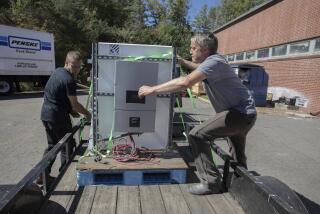Retraining alone doesn’t do the job
GREENVILLE, MICH. — When the Electrolux refrigerator factory shut down in 2006, idling almost 3,000 workers, this self-proclaimed Refrigerator Capital of the World put the last two locally produced units in a museum.
And the town itself might follow -- a once-thriving community overwhelmed by economic forces beyond its control and seemingly bound for history’s dustbin.
Waves of layoffs hit other factories. New start-ups cut back. Hard times hit local stores, service firms and government agencies.
Like hundreds of other American towns ravaged by the recession, Greenville learned how losing jobs can spread like a contagion through families and institutions that form the heart of a community.
Things got so bad that a special office was created recently to help more than 1,000 schoolchildren who had no real homes. “It’s a heinous situation,” said Brenda Greenhoe, director of the office.
Greenville, though, is more than a sad story. It’s a petri dish for testing one of the most widely prescribed remedies for reviving troubled communities -- job training.
The idea promoted by economists, business leaders and politicians is to send unemployed workers back to school to learn new skills for different jobs required in the new economy.
Only then, the argument goes, can such workers and the country as a whole regain the broad-based, sustainable prosperity that long defined American life with an economy that most workers can count on to build a better future.
“The fact is, we understand what it takes to build a stronger economy,” President Obama said recently. “Above all, it requires training and educating our citizens to out-compete workers from other countries.... That’s how we’re going to help more Americans climb into the middle class and stay there.”
But Greenville’s experience is both an encouraging tale of the potential for revitalization and a cautionary story of how hard it is to make job training work on a broad scale -- especially without a comprehensive government plan to make sure that new jobs exist and that companies offering them remain successful.
Over the last decade alone, about 42,000 U.S. factories have closed. No state was hit as hard as Michigan. Government leaders, including those in Greenville, responded by betting heavily on clean technologies, offering cash and tax incentives to attract companies involved in wind farms, solar energy and electric cars.
And, by consolidating a hodgepodge of federal programs, it provided as much as $5,000 a year for tuition and books for up to two years, as long as workers attended approved schools and enrolled in certificate or degree programs in fields of study deemed to have better job prospects.
During the last five years, hundreds of laid-off Greenville workers went back to school. Some sat in classrooms from 8 a.m. to 10 p.m. studying hydraulics and vacuum technology. Others trained in healthcare, transportation and the clean technologies widely seen as having bright futures.
Greenville, a town of 8,000 people set amid rolling fields and scattered lakes northeast of Grand Rapids, has worked hard to make retraining pay off. Nearly 600 former Electrolux workers took training at nearby Montcalm Community College, said Bob Ferrentino, the school’s president.
Hopes soared when the town recruited a solar panel maker, United Solar Ovonic, which built a state-of-the-art plant amid fields of potatoes and other crops.
But the results have been mixed, for reasons that go to the heart of the unemployment problem in Greenville and the rest of the country. Overall, about 55% of the retrained workers had jobs as of last year.
The placement rate for those who trained specifically for Uni-Solar is similar. Ferrentino said more than 100 went through that program; about 50 work there now.
After completing 22 courses over 13 months of intensive study, Debbie Campbell is one of the successes. Today, the 52-year-old ponytailed veteran of the refrigerator assembly line works as a Uni-Solar technician. She makes about what she did at Electrolux, where she put in 28 years and was paid $16 an hour.
But for every worker like Campbell, there are dozens for whom things did not turn out so well.
Jerry Cannon learned to drive an 18-wheeler, but the long stretches on the road have strained his health and family.
Karen Kamradt retrained to be a medical assistant but could not find work in her new field. Her experience illustrates another problem with retraining as a remedy for unemployment.
Nationwide, healthcare is one of the few sectors in which employment opportunities are growing. In theory, she should have had no trouble getting a good job.
Locally, however, healthcare jobs are not growing rapidly. And, for family reasons, Kamradt -- like many other workers -- found it impractical to move elsewhere. So she drives a school bus part time for $10.47 an hour and hopes her new healthcare skills will pay off down the road.
Penny Olmstead, who trained in solar technology and initially went to work at Uni-Solar, is an example of how job training alone -- unsupported by comprehensive policies at the national and state levels -- can end in disappointment.
Uni-Solar began with a hiring surge that by 2009 had climbed to 422 workers, including Olmstead.
But the Greenville plant’s primary market is Europe, and when sales in Italy and France declined as a result of the recession and other factors, Uni-Solar cut back.
Today, it employs only 230 workers here, and Olmstead is no longer among them.
Greenville and Uni-Solar also were hurt because state and federal policies simply weren’t in place to support them. Unlike the United States, for instance, Canada subsidizes consumers who adopt solar power, but only if they buy solar panels with domestically manufactured contents.
That has prompted Uni-Solar to build a new plant in Canada that will employ 80 workers there, instead of expanding its facility here.
“If we can sell, we can hire,” said Jay Knoll, an executive of Uni-Solar’s parent company.
Canada is not alone in adopting comprehensive programs of subsidies, tax provisions and other incentives to foster domestic industries. Germany has an elaborate program to support automobile, electronics and other manufacturing and to discourage its companies from moving operations overseas.
The United States has resisted these so-called industrial policies, with notable exceptions such as price subsidies for farmers. Instead of a government-coordinated approach, the U.S. usually has left matters to the private sector, and its multinational companies have moved tens of thousands of jobs overseas.
“The lack of policy takes this opportunity away from a community that was trying to reinvent itself,” said former Michigan Gov. Jennifer Granholm.
Solar panel technology was invented in the United States. So was the key technology for advanced batteries for electric vehicles, for which Michigan is also developing a number of factories.
But in each case, sales and production are tiny compared with European countries.
Even if clean technologies were to bloom, it’s not clear that they would produce large numbers of new jobs.
The Uni-Solar plant is the size of 10 football fields but so highly automated that it requires only a few dozen workers at any one time.
“That was supposed to be the big savior for this area, and it never happened,” said Mike Wills, a former Electrolux employee who works as a supervisor at God’s Love Closet, a men’s shelter where he once lived.
The shelter didn’t exist before Electrolux closed, making it one more sign of how the effects of joblessness spread through a community.
Though Greenville was never a rich community, the biggest names in refrigerators, from Ranney and Gibson to Frigidaire and Electrolux, had provided middle-class wages.
When jobs began disappearing, so did the lines at Huckleberry’s, a restaurant and pub at the center of Greenville’s three-block-long downtown.
Owner Mike Huckleberry remembers how hard it used to be to seat everybody on Thursday night, payday for many Electrolux workers. On a recent Thursday evening, the avuncular 62-year-old with a bushy white mustache tried to enliven things by holding a trivia contest. So few people turned up that it never got going.
Huckleberry still has his faithful, though many appear to be unemployed, like Erik Harms.
Harms, 47, earned $40,000 a year as the manager of Greenville Country Club before it closed last year. The hilltop golf course, where he worked for nearly three decades, is covered in weeds. “We had corporate people there,” he said, handing out a business card with his resume printed on the back.
“When we first lost our jobs, to me it was like a death,” said Marlene Line, 59.
She took 750 hours of classes to become a manicurist, and she currently has 10 clients who have their nails done once every two months -- $15 for the hands, $25 for the feet.
Her husband, Simeon Line, also a 31-year veteran of Electrolux, never found work again. His health failing, he went on disability. Now, he is tethered to an oxygen tank. “He kept saying it’ll all work out, but it didn’t,” she said. He grimaced as she broke down in tears.
During a long conversation at a Big Boy restaurant, their faces brightened just once -- when they talked about the monthly all-you-can-eat pollack and coleslaw fish fry in nearby Lakeview. Sponsored by the Amish community, it was once just a pleasant diversion.
Today it has the feel of a charity event.
More to Read
Inside the business of entertainment
The Wide Shot brings you news, analysis and insights on everything from streaming wars to production — and what it all means for the future.
You may occasionally receive promotional content from the Los Angeles Times.











